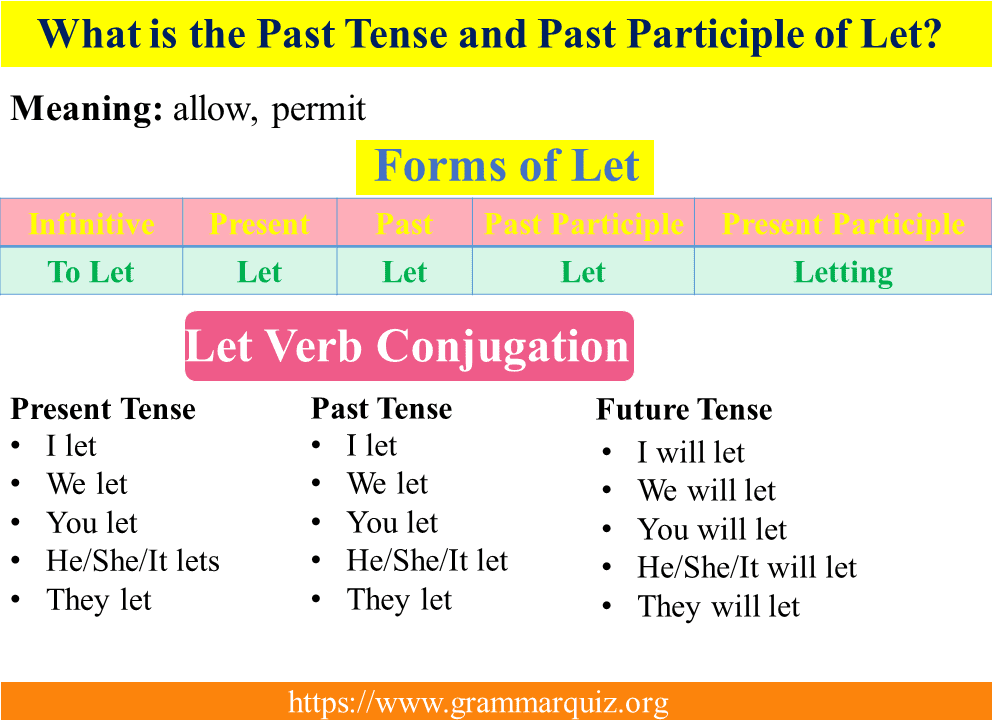Past Tense and Past Participle of Let

The verb let is an irregular verb. Its past and past participle forms are the same as the present form. The following are the primary forms of the verb let.
Meaning: allow, permit
Infinitive: to let
Present Form or V1: Let (third-person singular lets)
Past Form or V2: Let
Present Participle or Continuous Form: Letting
Past Participle or V3: Let
Conjugation of Let Indicative Mood Active Voice
Present Simple Tense
- I let
- He (She, It) lets
- We/You/They let
Past Simple Tense
- I let
- He (She, It) lets
- We/You/They let
Future Simple Tense
- I will let
- He (She, It) will let
- We/You/They will let
Present Continuous Tense
- I am + present participle of let
- He (She, It) is + present participle of let
- We/You/They are + present participle of let
Past Continuous Tense
- I was + present participle of let
- He (She, It) was + present participle of let
- We/You/They were + present participle of let
Future Continuous Tense
- I will be + present participle of let
- He/She/it will be + present participle of let
- We/You/They will be + present participle of let
Present Perfect Tense
- I have + past participle of let
- He (She, It) has + past participle of let
- We/You/They have + past participle of let
Past Perfect Tense
- I had + past participle of let
- He (She, It) had + past participle of let
- We/You/They had + past participle of let
Future Perfect Tense
- I shall have + past participle of let
- He (She, It) will have + past participle of let
- We/You/They will have + past participle of let
Present Perfect Continuous Tense
- I have been + present participle of let
- He/She/It has been + present participle of let
- We/You/They have been + present participle of let
Past Perfect Continuous Tense
- I had been + present participle of let
- He/She/It had been + present participle of let
- We/You/They had been + present participle of let
Future Perfect Continuous Tense
- I will have been + present participle of let
- He/She/It will have been + present participle of let
- We/You/They will have been + present participle of let
Conjugation of Let Indicative Mood Passive Voice
Present Simple Tense
- I am let
- He (She, It) is let
- We/You/They are let
Past Simple Tense
- I/ He (She, It) was let
- We/You/They are let
Future Simple Tense
- I/He (She, It) will be let
- We/You/They will be let
Present Continuous Tense
- I am being let
- He (She, It) is being let
- We/You/They are being let
Past Continuous Tense
- I/He (She, It) was being let
- We/You/They were being let
Future Continuous Tense
- I will be being let
- He (She, It) will be being let
- We/You/They will be being let
Present Perfect Tense
- I/We/You/They have been let
- He (She, It) has been let
Past Perfect Tense
- I/We/You/They had been let
- He (She, It) had been let
Future Perfect Tense
- I will/shall have been let
- He (She, It) will have been let
- We/You/They will have been let
Conjugation of Let Subjunctive Mood Active Voice
Present
- If I let
- If we let
- If you let
- If he (she, it) let
- If they let
Past
- If I let
- If we let
- If you let
- If he (she, it) let
- If they let
Future
- If I should let
- If we should let
- If you should let
- If he (she, it) should let
- If they should let
Conjugation of Let Subjunctive Mood Passive Voice
Present
- If I be let
- If we be let
- If you be let
- If he (she, it) be let
- If they be let
Past
- If I were let
- If we were let
- If you were let
- If he (she, it) were let
- If they were let
Future
- If I should be let
- If we should be let
- If you should be let
- If he (she, it) should be let
- If they should be let
Conditional
Present
- I/We should/would let
- He/She/It would let
- You/They would let
Perfect
- I/We should/would have let
- He/She/It would have let
- You/They would have let
Example Sentences
- The teacher let the party continue.
- Let me show you around.
- Don’t let her alone.
- Let me go!
- Let me help you.